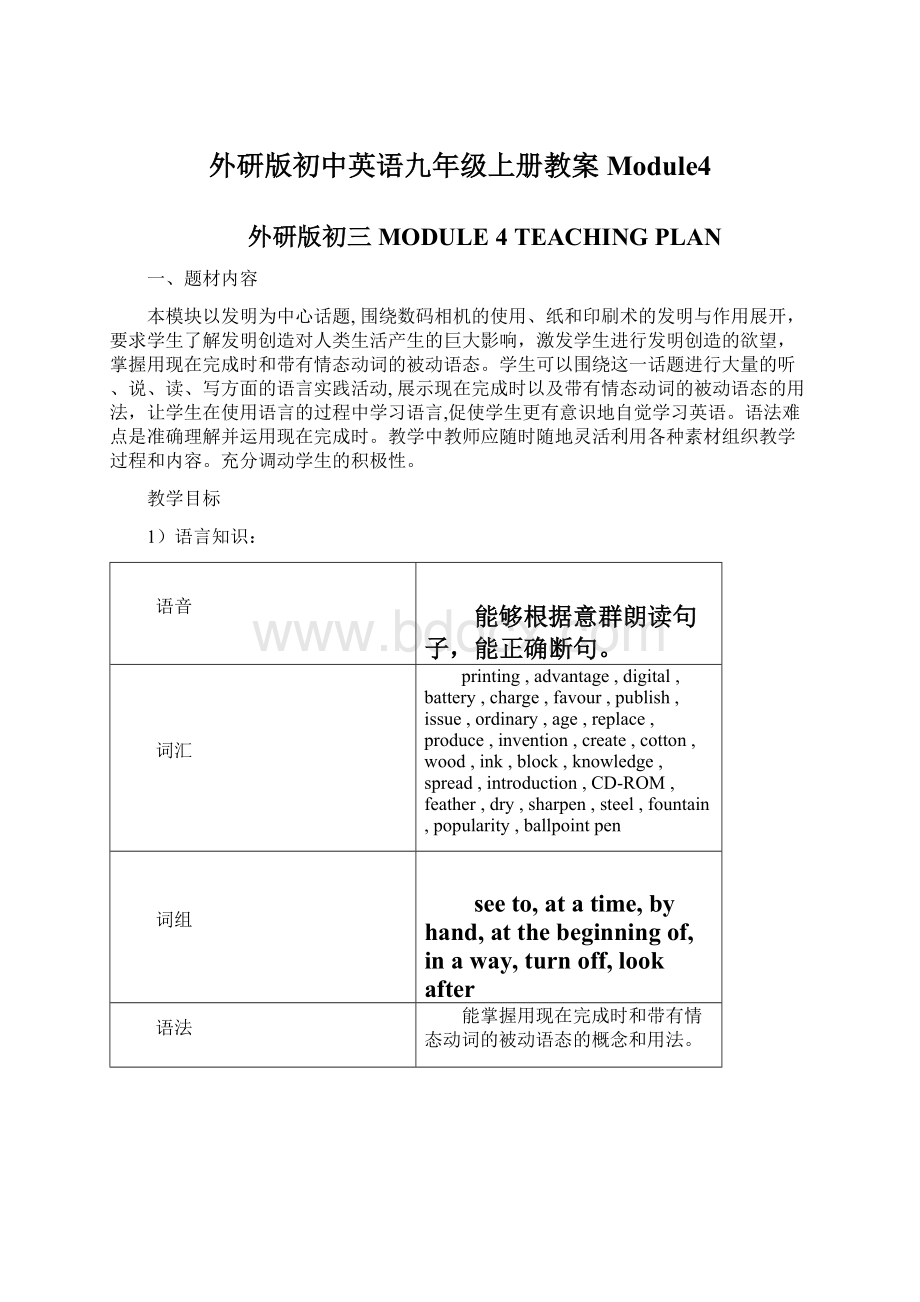外研版初中英语九年级上册教案Module4Word文档格式.docx
《外研版初中英语九年级上册教案Module4Word文档格式.docx》由会员分享,可在线阅读,更多相关《外研版初中英语九年级上册教案Module4Word文档格式.docx(14页珍藏版)》请在冰豆网上搜索。

能听懂有关发明及其应用的对话。
说
能谈论已有的发明创造给人类生活带来的变化。
读
能读懂谈论发明创造的文章;
了解发明对人类生活的影响。
写
能用被动语态的句子表述发明对人类的影响,并恰当使用asaresult,because和so。
演示与表达
能口头讲述一种现有发明的发明史和发展历程,提出自己的改进意见并和同学交流。
3)学习策略
学习一定程度形成自主学习,有效交际、信息处理、英语思维能力。
认知
联系,归纳,推测等技能。
学习查词典,阅读报纸,提高自学能力。
调控
从同伴处得到反馈,对自己在叙述及作文中的错误进行修改
交际
学习运用恰当词语描述发明创造对人类生活产生的巨大影响。
资源
通过阅读报纸等其他资源获取更多发明创造对人类生活产生的巨大影响的信息。
自学策略
能够根据自己的情况预习教材并进行拓展。
合作学习策略
能善于倾听别人的意见,扮演好组内的个人角色。
4)文化意识:
文化意识
了解发明创造对人类生活产生的巨大影响。
5)情感态度:
加深对人类文明史的了解。
6)任务:
对现有发明提出改进意见并展示。
教学重点和难点
重点:
1.通过谈论发明训练学生的听、说、读、写能力,掌握使用现在完成时和带有情态动词的被动语态
难点:
掌握使用带有情态动词的被动语态的概念和用法,养成正确使用现在完成时的能力。
教学方法
基于课程改革的理念及“第二语言习得论”,培养实现人的可持续发展和人的主体精神的自我完善和发展所必需的能力和素质,运用任务型教学途径,围绕核心任务,设定小任务,开展和谐愉悦的课堂活动,强调兴趣第一的原则,初步设计“P—T—P”自主学习立体模式:
pre-task…task-cycle…post-task。
二、教材处理
核心任务:
能够运用所学句型结构谈论希望工程。
三个环节如下:
pre-task:
学生联系生活实际,激活背景知识,。
task–cycle:
通过整个模块的听说读写的训练,强化现在完成时的表达能力,为完成任务做好铺垫
post-task:
达成任务,展示成果,反馈学习情况
三、教材安排
根据学生学习英语的特点和规律,我们把本模块划分为4课时:
Period1:
ListeningandVocabulary&
PronunciationandSpeaking
Period2:
ReadingandVocabulary
Period3:
Writing&
Aroundtheworld&
ModuleTask
Period4:
Languageinuse
注:
教学时应根据学生的学习水平、生活实际水平、接受程度及课堂出现的临时状况进行运用、调整及筛选。
『教学设计』
Title:
Module4Greatinventions
TeachingContent:
ListeningandVocabularyandPronunciationandSpeaking
TeachingAimsandDemands:
1.LanguageKnowledge
Keyvocabularyandphrases:
printing,advantage,digital,battery,charge,favour,publish,issue,ordinary,age,replace
Keystructure:
Presentperfectpassivevoiceandmodalverbpassivevoice(重点)
2.Listeningskill:
Tounderstandconversationsabouttheadvantagesofinventions.(难点)
3.Speakingskill:
Totalkabouthowinventionshavechangedpeople’slives
4.Attitudes:
Weshouldlearnmoreaboutinventions.
Learningstrategies:
Bottom–upapproachandlisteningtothetapeanddosomeexercises.
TeachingAids:
Multi-Media(Taperecorder,video,OHP,handout)
TeachingProcedures:
Part
:
Revision
Task:
RecallwhatwehavelearnedinthelastModule.
Directions:
Stepone:
Labelthepictureswiththewordsandexpressions.
(1).ReadthroughthewordsandexpressionsintheboxandhavetheSs.Repeatthemafteryou.
(2).Askthemtolabeltheminthepicturesonthescreen.
(3).Listsomewordswhichareconnectedwithgreatinventions.Askstudentstospeakoutasmanyastheycan.
Steptwo:
Tellthestoryofgreatinventions
Askstudentstospeakoutasmanyastheycan.
PartII:
Leadin:
Learnsomethingaboutgreatinventions.
Directions:
Introducegreatinventions:
Talkaboutthepicture.Askthestudentstolookatthepicturesaboutinvention.Elicitwhattheycansee.Ifthereareanynewwords,addthemtothelistontheboard.
Stepthree:
Completethepassagewiththesewords.
Stepfour:
Letthemcheckwithapartner.
Stepfive:
Thenaskthemtolistenandcheck.
PartIII:
Listening
Task1:
Listenandcheckthewordsasyouhearthem.
AsktheSstolookatthewordsinactivity2onpage26
Playtherecordingandhavethemlisten.
Playtherecordingagainandhavethemmatchthewords.
Playtherecordingandhavethemchecktheiranswerwithapartner
Callbacktheanswerfromthewholeclass.
Task2:
Tounderstandtheconversation.
Readthesummaryoftheconversation.Underlinethewronginformation
Tonywantstoborrowhisfather’sdigitalcamerabecausetheschoolmagazineisnowgoingtobeonpaper.Tonywantstotakesomephotosoftheschooldanceandthebasketballmatch.Tony’sdadishappytoborrowthecameraandtellsTonytoturnitoff.HepromisesTonytolookafterit.
Task3:
Sslistentothedialogueandanswerthequestionsinactivity5onpage27
AsktheSstolookatthequestionsinactivity5onpage27
Playtherecordingagainandhavethemanswer.
.Playtherecordingandhavethemchecktheiranswerwithapartner
Task4:
Activity6onpage27.
Findthesentencesintheconversationwhichmean…
1)Iwilldowhatyoutellmeto.
2)Whydon’tyoucontinuetopunishthemagazineonpaper?
3)Couldyouunderstandme?
4)Doyouunderstandme?
5)It’snotaproblem.I’llchargethebattery.
6)Changingthesubject,willyoulendmeyourcamera?
Readthedialogue.Havethemchecktheiranswerswithapartner
Stepthree:
Callbacktheanswerinawhole-classsetting.(Collecttheanswersincompletesentencesfromtheclass.)
Task5:
Listenandread:
PlaytherecordingandasktheSs.tolistenandreadtheconversation.
Playtherecordingagainandpauseaftereachphrase,askingtheSs.torepeatchorallyandindividually.
PuttheSs.intogroupsof2topractisethedialogue.
Theyshouldrepeatitseveraltimes,changingtheroleseachtime.
PartIV:
Pronunciation
ListenandrepeatinActivity7onpage27
AsktheSstolistenandrepeatthesentences.
Playtherecordingagain.AsktheSstopayparticularattentiontotheintonationofthesentences.
AsktheSstolistenandrepeatchorallyandindividually.
Task2:
Talkabouttheadvantagesoftheseinventions.
AsktheSstocompletethisworkinpairs.
AsktheSstopayparticularattentiontothestructureofthesentences.
PartV:
AtestDoEx2onpage124intheWB.
PartVI:
Homework:
Recitethedialogueasfluentlyaspossible.
Period2ReadingandVocabulary
TeachingAimsandDemands:
1.Languageknowledge:
Keywords:
produce,invention,create,cotton,wood,ink,block,knowledge,spread,introduction,CD-ROM
Keystructures:
Presentperfectpassivevoiceandmodalverbpassive.(重点)
2.Togetinformationaboutcreationofpaperandprintingandhowtheseinventionshavechangedpeople’slife.(难点)
3.Attitudes:
Weshouldlovescience.
Communicativeapproach.
1.HelpstudentstorevisewhatwaslearntinPeriodoneofthismodule.
Showthemsomepicturesaboutgreatinventions.HavetheSs.talkaboutthem.
2.RevisethesentencesofPresentperfectpassivevoiceandmodalverbpassiveinUnit1.
Preparation
Learnthenewwords.
Labelthepictureswiththewords.
(1).Readthroughthewordsonthescreen.HavetheSs.Repeatthemafteryou.
(2).Readthewordsseparatelyandhavethemrememberthem.
(3).Makesomesentenceswiththewords.
(4)Callbacktheanswersfromthewholeclass.
Readthetitleandtalkabouttheadvantagesofbothbooksandcomputes.
(1).Readthetitleofthetextonthescreen.HavetheSs.discusstheadvantagesofbothbooksandcomputers.
(2).Callbacksomecommentsfromthewholeclass.
ScanningandSkimming
Readthepassageandchoosethemainidea.
TheteacherasktheSstoreadthepassage“Canbooksbereplacedbycomputers?
”
Ssreadthepassageandfindthemainidea,givingreasonsforthechoicegiven.
Callbacktheanswersfromthewholeclass,havingindividualsreadouttheanswer
2.Task:
Matchthewordswiththeirmeanings
AsktheSstolookatthescreenindividually.Theycanuseadictionaryifnecessary.Thencheckwithapartner.
Callbacktheanswersfromthewholeclassascompletesentences.
3.Task:
Readthepassageandmakenotestocompletethetimelilneinactivity3onpage29.
ReadthroughthepassageandmakesuretheSsunderstandwhattodo.Ssdoactivity3onpage29individuallyandcheckwithapartner.
Callbacktheanswersfromthewholeclass,havingindividualsreadouttheanswers
Dealingwithexpressions:
1.looksthrough浏览,温习
eg.Helookedthroughmanybooksinordertofindthecorrectanswer.
为了找到正确答案,他查阅了许多书籍.
2.with–without带有…/没有…
eg.Hefoundahousewithmanytreesaround.他找到了一所周围有许多树的房子.
Hewenttoschoolwithoutbreakfasttoday.他今天没有吃早饭就去上学了.
3.bemadeof----
bemadefrom---
bemadeupof---
bemadein------
bemadeby—
bemadeinto–--
Ex.1.Lookatthecamera,Whereisit________________?
Japan.
2.Thetableis____________wood,whilepaperis___________wood.
3.Ourclassis______________twentyboysandtwentythreegirls.
4.Themetalcanbe____________aknife.
5.Thiskindofcaris_____________manyworkersinthefactory.
4.writewordson--
makeabook--
inthosedays--
atatime--
byhand---
asaresult----
Ex.1.Hecouldeveneatthree